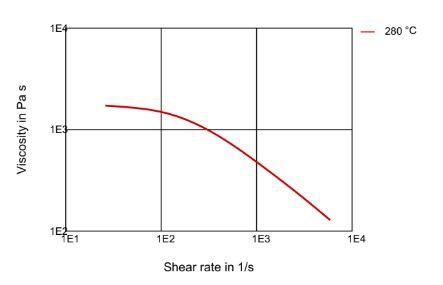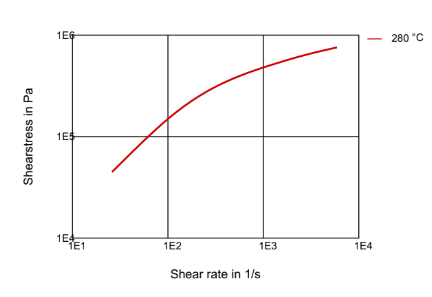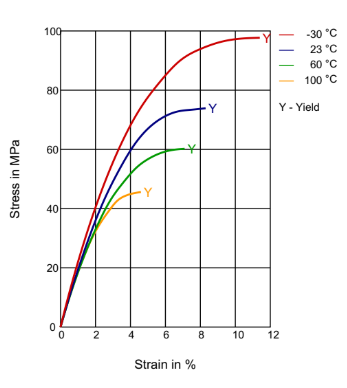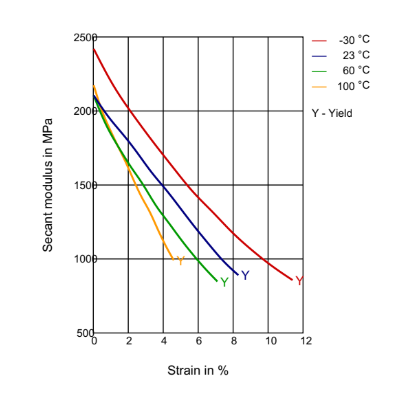Enhanced TDS
Identification & Functionality
- Blend
- No
- Chemical Family
- Country of Origin
- Function
- Resin
- Plastics & Elastomers Functions
- Polymer Name
- Product Code
- MITM15002
- Single Ingredient
- Yes
- Technologies
- Product Families
Features & Benefits
- Labeling Claims
- Materials Features
Applications & Uses
- Plastics & Elastomers End Uses
- Plastics & Elastomers Processing Methods
- Markets
- Applications
- Processing Information
Injection molding conditions
- Typical melt temperature (Min / Recommended / Max) : 270°C / 290°C / 310°C
- Typical mold temperature : 40 - 80 °C
- Dyring time and temperature (only for bags opened for more than two hours): 4 - 6 hours at 90°C
Extrusion conditions
- Typical melt temperature (Min / Recommended / Max) : 270°C / 280°C / 290°C
- Dyring time and temperature (only for bags opened for more than two hours): 4 - 6 hours at 90°C
Properties
- Physical Form
Technical Details & Test Data
- Technical Data
Viscosity-shear Rate

Shearstress-shear Rate

Dynamic Shear Modulus-temperature Dynamic Tensile Modulus-temperature

Stress-strain

Secant Modulus-strain

Packaging & Availability
- Packaging Type
Principal Information
- Group Principal Number
- S000003
- Principal
Other
- Color (SDS)
- Colorless
- Insoluble in (SDS)
- Sulphuric acid
- Item Number
- Other Hazards
- Processing may release vapors and/or fumes which cause eye, skin and respiratory tract irritation, Prolonged or repeated exposure may cause: headache, drowsiness, nausea, weakness, (severity of effects depends on extent of exposure).
- Temperature Control
- No
- USA/DOT UN Number
- Not Applicable
- Electrical Properties
Value Units Test Method / Conditions Comparative Tracking Index 600.0 - IEC 60112 dry basis Dielectric Strength 50.0 kV/mm kV/mm IEC 60243-1 dry basis Volume Resistivity 100000000000.0 Ω-cm Ω-cm IEC 60093 dry basis - Mechanical Properties
Value Units Test Method / Conditions Charpy Impact Strength 13.0 kJ/m² kJ/m² ISO 179-1EA at 23°C, dry, notched Charpy Impact Strength 13.0 kJ/m² kJ/m² ISO 179-1EA at -30°C, dry, notched Hardness 79.0 Shore D Shore D at 15 sec Hardness 79.0 Shore A Shore A ISO 868 at 15 sec Nominal Strain at Break min. 50.0 % % ISO 527-1 condensed, at break, nominal Nominal Strain at Break min. 50.0 % % ISO 527-1 dry, at break, nominal Nominal Strain at Break min. 50.0 % % ISO 527-2 condensed, nominal Nominal Strain at Break min. 50.0 % % ISO 527-2 dry, at break, nominal Strain at Yield 8.0 % % ISO 527-1 condensed Strain at Yield 76.0 % % ISO 527-2 condensed Tensile Modulus 2100.0 MPa MPa ISO 527-1 condensed Tensile Modulus 2100.0 MPa MPa ISO 527-2 condensed - Optical Properties
Value Units Test Method / Conditions Light Transmittance 91.0 % % ISO 13468-1 Light Transmittance 91.0 % % ISO 13468-2 - Physical Properties
Value Units Test Method / Conditions Density 1.0 g/cm³ g/cm³ ISO 1183 condensed Density 1050.0 kg/m³ kg/m³ ISO 1183 dry basis Glass Transition Temperature (Tg) 168.0 °C °C ISO 11357-1 at 10°C/min, dry Glass Transition Temperature (Tg) 168.0 °C °C ISO 11357 at 10°C/min, dry Humidity Absorption 1.7 % % ISO 62 at 23°C, dry Load/Unload Temperature 150.0 °C °C ISO 75-1 at 0.45 MPa, dry, deflection under load Load/Unload Temperature 136.0 °C °C ISO 75-1 at 1.80 MPa, dry, deflection under load Load/Unload Temperature 150.0 °C °C ISO 75-2 at 0.45 MPa, dry, deflection under load Load/Unload Temperature 136.0 °C °C ISO 75-2 at 1.80 MPa, dry, deflection under load Melt Volume-Flow Rate 2.0 cm³/10 min cm³/10 min ISO 1133 at 275°C, 2.16 kg, dry Mold Shrinkage 0.7 % % ISO 2577 normal, dry Mold Shrinkage 0.7 % % ISO 2577 parallel, dry Mold Shrinkage 0.7 % % ISO 294-4 normal, dry Mold Shrinkage 0.7 % % ISO 294-4 parallel, dry Softening Point 160.0 °C °C ISO 306 at 50°C/h, 50N, dry Thickness 1.6 mm mm condensed Water Absorption 3.8 % % ISO 62 at 23°C, dry - SDS Physical and Chemical Properties
Value Units Test Method / Conditions Bulk Density (SDS) 600.0 kg/m³ kg/m³ at 20°C Decomposition Temperature (SDS) min. 662.0 °F °F - Shelf Life & Stability
Value Units Test Method / Conditions Shelf Life 2.0 yr yr - Thermal Properties
Value Units Test Method / Conditions Coefficient of Thermal Expansion 0.00007 /K /K ISO 11359-1 dry, parallel Coefficient of Thermal Expansion 0.00007 /K /K ISO 11359-2 parallel, dry
